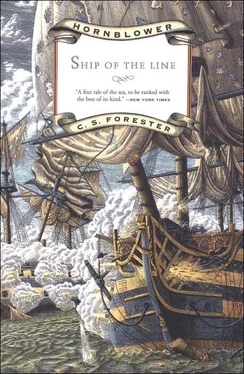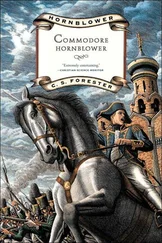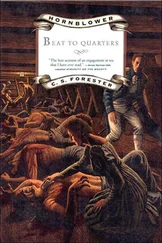While the salute was being returned a hoist of flags ran up the Pluto’s rigging.
“ Sutherland’s pendant,” read off Vincent, “Take station astern.”
“Acknowledge.”
The hoist was succeeded by another.
“ Sutherland’s pendant,” said Vincent again. “Flag to captain. Come on board and report.”
“Acknowledge. Mr. Gerard, clear away my barge. Where’s Colonel Villena?”
“Not seen him yet this morning, sir.”
“Here, Mr. Savage, Mr. Longley. Run down and get Colonel Villena out of bed. I want him ready as soon as my barge is cleared away.”
“Aye aye, sir.”
It took two and a half minutes before the captain’s barge was in the water with Hornblower seated in the stern, and at the very last second Villena made his appearance at the ship’s side. He looked as disagreeable as might be expected, at having been routed out of bed by two brusque midshipmen who could speak no word of his language and dressed with their clumsy and hurried aid. His busby was awry and his coat incorrectly hooked, and his sabre and pelisse still hung over his arm. He was hauled down into the boat by the impatient boat’s crew, who did not want to imperil their ship’s reputation for smartness by waiting for him after the admiral had signalled for them.
Villena lurched miserably to his thwart beside Hornblower. He was unshaven and bedraggled, and his eyes were as gummy as Hornblower’s had been on his awakening. He sat down, muttering and grumbling, still half asleep, trying in dazed fashion to complete his dressing, while the men bent to their oars and sent the barge skimming over the water. It was only as they neared the flagship that Villena was able to open his eyes fully and begin to talk, and for the short remaining period Hornblower felt no need for elaborate politeness. He was full of hope that the admiral would invite Villena to be his guest for the sake of any information he could give regarding conditions ashore.
Captain Elliott was at the ship’s side to greet him as they came on board.
“Glad to see you, Hornblower,” he said, and then in response to Hornblower’s introduction he mumbled incoherently to Villena eyeing the latter’s gaudy uniform and unshaven chin in blank astonishment. He was obviously relieved when the formality was over and he could address himself to Hornblower again. “The admiral’s in his cabin. This way, gentlemen please.”
The flag lieutenant in the admiral’s cabin along with the admiral was young Sylvester, whom Hornblower had heard of as a capable young officer even though he was—as might have been expected—a sprig of the nobility. Leighton himself was ponderous and slow of speech this morning; in the stifling heat the sweat was visible in little rivers running down the sides of his heavy chin. He and Sylvester made a brave attempt to welcome Villena. They both of them spoke French fairly well and Italian badly, and by amalgamating what they knew of those two languages with what remained of their schoolboy Latin they were able to make themselves understood, but it was heavy going. Obviously with relief Leighton turned to Hornblower.
“I want to hear your report, Hornblower,” he said.
“I have it here in writing, sir.”
“Thank you. But let us hear a little about your doings verbally. Captain Bolton tells me he spoke a prize you had taken. Where did you go?”
Hornblower began his account—he was glad that events had moved so fast that he was able to omit all reference to the circumstances in which he had parted company from the East India convoy. He told of his capture of the Amelie and of the little fleet of small vessels at Llanza. The admiral’s heavy face showed a gleam of extra animation when he heard that he was a thousand pounds the richer as a result of Hornblower’s activity, and he nodded sympathetically when Hornblower explained the necessity of burning the last prize he had taken—the coaster near Cette. Cautiously Hornblower put forward the suggestion that the squadron might be most profitably employed in watching between Port Vendres and Rosas, on which stretch, thanks to the destruction of the battery at Llanza, there was now no refuge for French shipping. A hint of a groove appeared between the admiral’s eyebrows at that, and Hornblower swerved away from the subject. Clearly Leighton was not the sort of admiral to welcome suggestions from his inferiors.
Hornblower hurriedly began to deal with the next day’s action to the south-westward.
“One moment, Captain,” said Leighton. “You mean you went southward the night before last?”
“Yes, sir.”
“You must have passed close to this rendezvous during the darkness?”
“Yes, sir.”
“You made no attempt to ascertain whether the flagship had arrived?”
“I gave orders for a specially good lookout to be kept, sir.”
The groove between Leighton’s eyebrows was very noticeable now. Admirals were always plagued by the tendency of their captains, when on blockade service, to make excuses to get away and act independently—if only because it increased their share of prize-money—and obviously Leighton was not merely determined to deal drastically with any such tendency but also he guessed that Hornblower had been careful to arrange his cruise so as to pass the rendezvous at night.
“I am extremely annoyed, Captain Hornblower, that you should have acted in such a fashion. I have already admonished Captain Bolton for allowing you to go, and now that I find you were within ten miles of here two nights ago I find it difficult to express my displeasure. I reached the rendezvous that very morning, as it happened, and as a result of your behaviour two of His Majesty’s ships of the line have been kept idle here for nearly forty-eight hours until you should see fit to rejoin. Please understand, Captain Hornblower, that I am very annoyed indeed, and I shall have to report my annoyance to the admiral commanding in the Mediterranean, for him to take any action he thinks necessary.”
“Yes, sir,” said Hornblower. He tried to look as contrite as he could, but his judgment told him that it was not a court martial matter—he was covered by Bolton’s orders—and it was doubtful if Leighton would really carry out his threat of reporting to higher authority.
“Please continue,” said Leighton.
Hornblower began to describe the action against the Italian divisions. He could see by Leighton’s expression that he attached little importance to the moral effect achieved, and that his imagination was not powerful enough to allow him to gauge the effect on the Italians of an ignominious retreat before an invulnerable enemy. At Hornblower’s suggestion that they had lost five hundred men at least Leighton moved restlessly and exchanged glances with Sylvester—he clearly did not believe him. Hornblower decided discreetly not to put forward his estimate that the Italians had lost at least another five hundred men through straggling and desertion.
“Very interesting,” said Leighton, a trifle insincerely.
A knock at the cabin door and the entrance of Elliott eased the situation.
“The weather’s looking very nasty, sir,” he said. “I was thinking that if Captain Hornblower wishes to rejoin his ship—”
“Yes, of course,” said Leighton, rising.
From the deck they could see black clouds to leeward, rising rapidly against the wind.
“You’ll only just have time,” said Elliott, looking at the sky as Hornblower prepared to go down into his barge.
“Yes indeed,” said Hornblower. His main anxiety was to get away from the Pluto before anyone noticed that he was leaving Villena behind—the latter, with no understanding of the English conversation, was hanging back on the quarterdeck, and Hornblower was able to scramble down into the boat without anyone thinking of him.
Читать дальше









